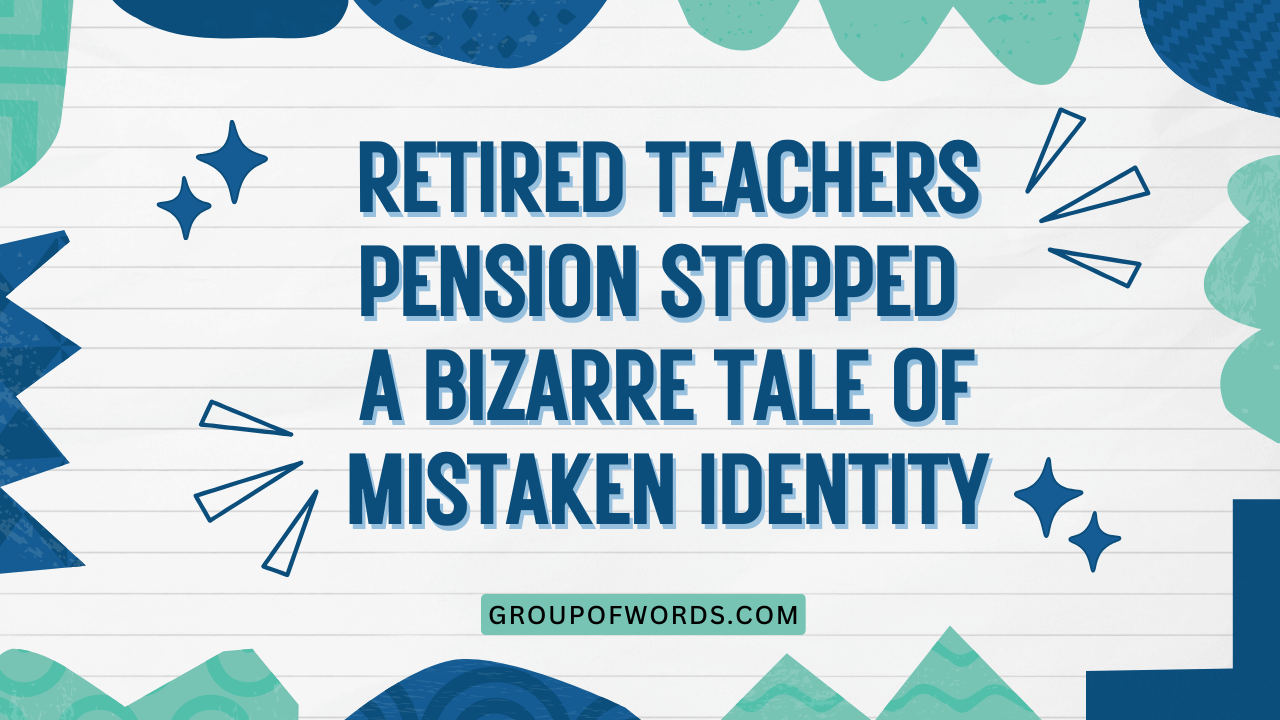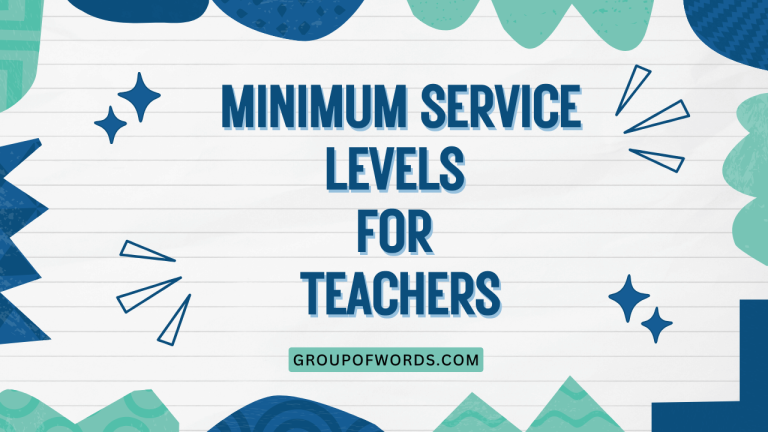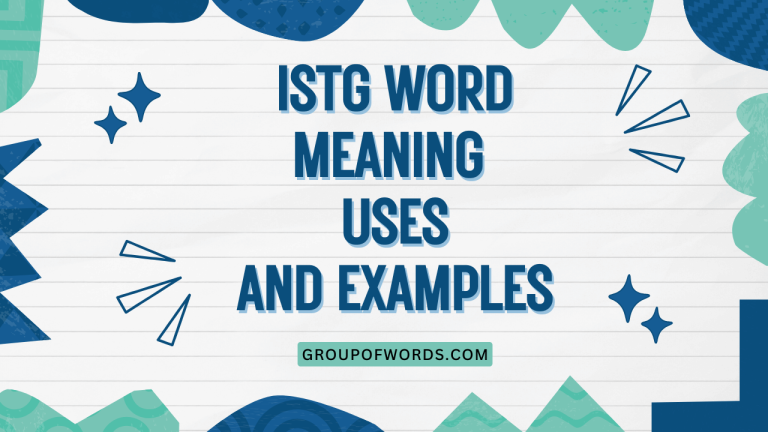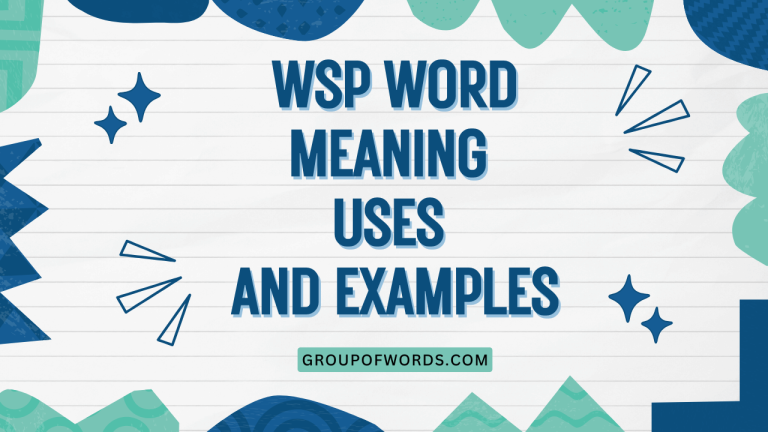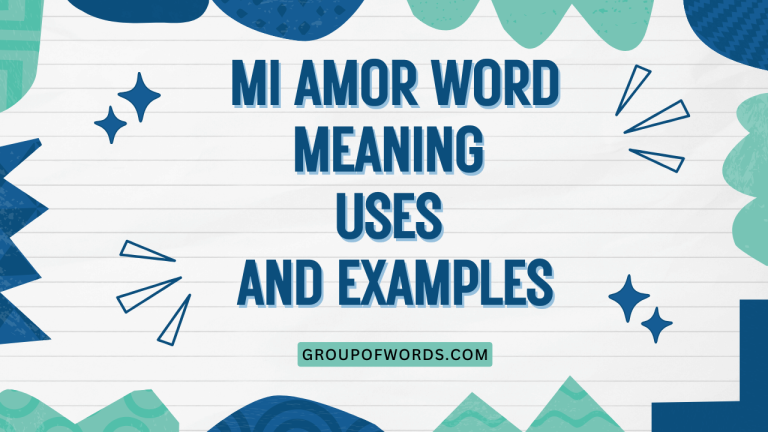Retired Teacher’s Pension: A Bizarre Tale of Mistaken Identity
The English language, with its intricate rules and nuanced structures, often presents challenges even to native speakers. One particularly interesting area involves the interplay of nouns, verbs, and modifiers in complex sentence structures.
This article delves into a somewhat unusual, yet grammatically rich, phrase: “retired teacher’s pension stopped: a bizarre tale of mistaken identity.” Understanding the grammatical relationships within this phrase can help us appreciate the flexibility and potential ambiguity of English, and ultimately improve our reading comprehension and writing skills. This guide is designed for English language learners, grammar enthusiasts, and anyone interested in dissecting the intricacies of English sentence structure.
Table of Contents
- Introduction
- Definition: Understanding the Phrase
- Structural Breakdown
- Types and Categories of Noun Phrases
- Examples
- Usage Rules and Guidelines
- Common Mistakes
- Practice Exercises
- Advanced Topics
- Frequently Asked Questions
- Conclusion
Introduction
The phrase “retired teacher’s pension stopped: a bizarre tale of mistaken identity” is a compelling example of how concise language can convey a complex narrative. At first glance, it might seem like a simple statement, but a closer examination reveals a rich tapestry of grammatical relationships and potential interpretations.
This article will break down the phrase, analyzing its components and exploring the various ways it can be understood. We will examine the roles of the nouns, verbs, and modifiers, and discuss how they contribute to the overall meaning.
By understanding the grammatical structure of this phrase, we can gain a deeper appreciation for the nuances of the English language and improve our ability to comprehend and construct similar complex sentences.
Definition: Understanding the Phrase
The phrase “retired teacher’s pension stopped: a bizarre tale of mistaken identity” can be analyzed as a concise summary of a news headline or a brief description of an event. It essentially tells a story in a very compressed format.
Let’s break down the components:
- Retired Teacher’s Pension: This is a noun phrase acting as the subject of the sentence (implied). It refers to the pension belonging to a retired teacher. The possessive ‘s indicates ownership.
- Stopped: This is the verb, indicating that the pension payments have ceased. It’s in the past participle form and implies a passive voice construction (e.g., “the pension was stopped”).
- A Bizarre Tale of Mistaken Identity: This phrase acts as an appositive, providing further information or explanation about the event. It suggests the reason for the pension being stopped is due to a strange case of mistaken identity.
In essence, the phrase conveys that a retired teacher’s pension payments have been halted due to a strange case of mistaken identity. This is a complex piece of information packed into a short, attention-grabbing statement.
The phrase acts as a title or summary of a longer story.
Classification of Grammatical Elements
To better understand the phrase, let’s look at the classification of each element:
- Retired: Adjective, modifying “teacher.”
- Teacher’s: Noun (possessive form), indicating ownership of the pension.
- Pension: Noun, the thing being stopped.
- Stopped: Verb (past participle), indicating the action.
- A: Article (indefinite), introducing the noun phrase.
- Bizarre: Adjective, describing the tale.
- Tale: Noun, the subject of the “bizarre” description.
- Of: Preposition, connecting “tale” and “mistaken identity.”
- Mistaken Identity: Noun phrase, the cause of the pension stoppage.
Function in the Sentence
Each word in the phrase plays a specific function:
- Retired Teacher’s Pension: Subject (implied) – What the sentence is about.
- Stopped: Predicate (verb) – The action that happened to the subject.
- A Bizarre Tale of Mistaken Identity: Appositive – Providing additional information about why the action occurred.
Contexts of Usage
This type of phrase is typically found in:
- News Headlines: To quickly grab the reader’s attention.
- Summaries: To provide a concise overview of a longer story.
- Titles: For articles, books, or reports.
Structural Breakdown
The phrase can be broken down into two main parts:
- Noun Phrase + Verb: “Retired teacher’s pension stopped”
- Appositive Phrase: “A bizarre tale of mistaken identity”
The first part, “retired teacher’s pension stopped,” functions as a concise sentence, where the noun phrase “retired teacher’s pension” acts as the implied subject, and “stopped” is the verb. The second part, “a bizarre tale of mistaken identity,” is an appositive phrase that provides further explanation or context for why the pension was stopped.
Appositives rename or describe a noun or noun phrase and are usually set off by commas (though in headline style, commas are often omitted for brevity).
Let’s examine the structure in more detail:
- Retired teacher’s pension
- Retired: Adjective (modifies teacher)
- Teacher’s: Noun (possessive, modifies pension)
- Pension: Noun (the main subject)
- Stopped: Verb (past participle)
- A bizarre tale of mistaken identity
- A: Article
- Bizarre: Adjective (modifies tale)
- Tale: Noun
- Of: Preposition
- Mistaken identity: Noun phrase (object of the preposition)
The possessive ‘s in “teacher’s” is crucial. It indicates that the pension belongs to the teacher.
Without it, the meaning would be significantly different.
Types and Categories of Noun Phrases
The noun phrase “retired teacher’s pension” is a complex noun phrase with several layers of modification. Let’s explore some types of noun phrases and how they relate to this example:
Simple Noun Phrases
A simple noun phrase consists of a single noun or pronoun. For example:
- Teacher
- Pension
- He
- She
Complex Noun Phrases
A complex noun phrase includes modifiers such as adjectives, adverbs, and prepositional phrases. “Retired teacher’s pension” falls into this category because it includes the adjective “retired” and the possessive noun “teacher’s” modifying the main noun “pension.”
Possessive Noun Phrases
A possessive noun phrase indicates ownership or belonging. In our example, “teacher’s” is a possessive noun, showing that the pension belongs to the teacher.
Noun Phrases as Subjects
Noun phrases often function as the subject of a sentence. In the phrase “retired teacher’s pension stopped,” the noun phrase “retired teacher’s pension” is the implied subject, even though the verb “stopped” suggests a passive construction where the pension is acted upon.
Examples
To further illustrate the usage and structure of similar phrases, let’s look at some examples. We will explore examples of noun phrases acting as subjects, followed by a verb and an appositive phrase.
The following tables will provide various examples, demonstrating how these phrases can be constructed and understood in different contexts.
Table 1: Examples with Noun Phrase Subject, Verb, and Appositive
This table showcases phrases that follow the same structural pattern as our original example: a noun phrase subject, a verb, and an appositive phrase providing additional context.
| Phrase | Analysis |
|---|---|
| “Local bakery’s sales soared: a testament to quality ingredients.” | Noun Phrase: Local bakery’s sales; Verb: soared; Appositive: a testament to quality ingredients. |
| “Company’s profits declined: a direct result of poor management.” | Noun Phrase: Company’s profits; Verb: declined; Appositive: a direct result of poor management. |
| “Student’s grades improved: a sign of diligent study habits.” | Noun Phrase: Student’s grades; Verb: improved; Appositive: a sign of diligent study habits. |
| “City’s air quality worsened: a consequence of industrial pollution.” | Noun Phrase: City’s air quality; Verb: worsened; Appositive: a consequence of industrial pollution. |
| “New restaurant’s opening delayed: a setback due to permit issues.” | Noun Phrase: New restaurant’s opening; Verb: delayed; Appositive: a setback due to permit issues. |
| “Museum’s attendance increased: a boon from the popular exhibit.” | Noun Phrase: Museum’s attendance; Verb: increased; Appositive: a boon from the popular exhibit. |
| “Team’s performance faltered: an outcome of internal conflicts.” | Noun Phrase: Team’s performance; Verb: faltered; Appositive: an outcome of internal conflicts. |
| “Author’s book became bestseller: a reward for years of dedication.” | Noun Phrase: Author’s book; Verb: became bestseller; Appositive: a reward for years of dedication. |
| “Farmer’s harvest failed: a tragedy caused by severe drought.” | Noun Phrase: Farmer’s harvest; Verb: failed; Appositive: a tragedy caused by severe drought. |
| “Software’s update released: a fix for critical security vulnerabilities.” | Noun Phrase: Software’s update; Verb: released; Appositive: a fix for critical security vulnerabilities. |
| “Building’s construction halted: a problem stemming from funding shortages.” | Noun Phrase: Building’s construction; Verb: halted; Appositive: a problem stemming from funding shortages. |
| “Website’s traffic surged: a benefit from the marketing campaign.” | Noun Phrase: Website’s traffic; Verb: surged; Appositive: a benefit from the marketing campaign. |
| “Product’s demand decreased: a reflection of changing consumer preferences.” | Noun Phrase: Product’s demand; Verb: decreased; Appositive: a reflection of changing consumer preferences. |
| “School’s reputation improved: a result of dedicated teachers.” | Noun Phrase: School’s reputation; Verb: improved; Appositive: a result of dedicated teachers. |
| “Patient’s condition stabilized: a relief after days of uncertainty.” | Noun Phrase: Patient’s condition; Verb: stabilized; Appositive: a relief after days of uncertainty. |
| “Project’s deadline extended: a necessity due to unforeseen delays.” | Noun Phrase: Project’s deadline; Verb: extended; Appositive: a necessity due to unforeseen delays. |
| “Investment’s value plummeted: a consequence of market volatility.” | Noun Phrase: Investment’s value; Verb: plummeted; Appositive: a consequence of market volatility. |
| “Program’s funding approved: a victory for community initiatives.” | Noun Phrase: Program’s funding; Verb: approved; Appositive: a victory for community initiatives. |
| “Car’s engine failed: a mishap during the long road trip.” | Noun Phrase: Car’s engine; Verb: failed; Appositive: a mishap during the long road trip. |
| “Phone’s battery drained: an inconvenience before the important meeting.” | Noun Phrase: Phone’s battery; Verb: drained; Appositive: an inconvenience before the important meeting. |
Table 2: Examples with Different Appositive Structures
This table provides examples where the appositive phrase takes on different structures and forms, further enriching the understanding of how it can be used to provide additional information.
| Phrase | Analysis |
|---|---|
| “Company’s stock price increased: a pleasant surprise for investors.” | Noun Phrase: Company’s stock price; Verb: increased; Appositive: a pleasant surprise for investors. |
| “Government’s new policy implemented: a controversial decision sparking debate.” | Noun Phrase: Government’s new policy; Verb: implemented; Appositive: a controversial decision sparking debate. |
| “University’s research grant awarded: a significant boost to the science department.” | Noun Phrase: University’s research grant; Verb: awarded; Appositive: a significant boost to the science department. |
| “Dog’s barking ceased: a welcome silence after hours of noise.” | Noun Phrase: Dog’s barking; Verb: ceased; Appositive: a welcome silence after hours of noise. |
| “Flower’s blooming began: a colorful display of spring’s arrival.” | Noun Phrase: Flower’s blooming; Verb: began; Appositive: a colorful display of spring’s arrival. |
| “Planet’s discovery announced: a monumental achievement in astronomy.” | Noun Phrase: Planet’s discovery; Verb: announced; Appositive: a monumental achievement in astronomy. |
| “Train’s arrival delayed: an unfortunate circumstance disrupting travel plans.” | Noun Phrase: Train’s arrival; Verb: delayed; Appositive: an unfortunate circumstance disrupting travel plans. |
| “Game’s release postponed: a disappointment for eager fans.” | Noun Phrase: Game’s release; Verb: postponed; Appositive: a disappointment for eager fans. |
| “Movie’s screening cancelled: a regrettable situation due to technical issues.” | Noun Phrase: Movie’s screening; Verb: cancelled; Appositive: a regrettable situation due to technical issues. |
| “Concert’s tickets sold out: a testament to the artist’s popularity.” | Noun Phrase: Concert’s tickets; Verb: sold out; Appositive: a testament to the artist’s popularity. |
| “Conference’s registration closed: a sign of the event’s high demand.” | Noun Phrase: Conference’s registration; Verb: closed; Appositive: a sign of the event’s high demand. |
| “Workshop’s participants increased: a reflection of the topic’s relevance.” | Noun Phrase: Workshop’s participants; Verb: increased; Appositive: a reflection of the topic’s relevance. |
| “Festival’s celebration commenced: a vibrant display of cultural traditions.” | Noun Phrase: Festival’s celebration; Verb: commenced; Appositive: a vibrant display of cultural traditions. |
| “Competition’s winners announced: a moment of triumph for the top performers.” | Noun Phrase: Competition’s winners; Verb: announced; Appositive: a moment of triumph for the top performers. |
| “Exhibition’s opening successful: a promising start to the art season.” | Noun Phrase: Exhibition’s opening; Verb: successful; Appositive: a promising start to the art season. |
| “Lecture’s attendance declined: a concern about the speaker’s reputation.” | Noun Phrase: Lecture’s attendance; Verb: declined; Appositive: a concern about the speaker’s reputation. |
| “Seminar’s feedback positive: a sign of the presenter’s effectiveness.” | Noun Phrase: Seminar’s feedback; Verb: positive; Appositive: a sign of the presenter’s effectiveness. |
| “Meeting’s adjournment announced: a relief after hours of discussion.” | Noun Phrase: Meeting’s adjournment; Verb: announced; Appositive: a relief after hours of discussion. |
| “Party’s atmosphere lively: a celebration of friendship and joy.” | Noun Phrase: Party’s atmosphere; Verb: lively; Appositive: a celebration of friendship and joy. |
| “Trip’s itinerary finalized: a plan for an exciting adventure.” | Noun Phrase: Trip’s itinerary; Verb: finalized; Appositive: a plan for an exciting adventure. |
Table 3: Examples with Possessive Nouns and Different Verbs
This table demonstrates how possessive nouns can be incorporated into these types of phrases, and showcases various verbs that can be used to describe actions or states of being.
| Phrase | Analysis |
|---|---|
| “Neighbor’s garden flourished: a beautiful sight for the community.” | Noun Phrase: Neighbor’s garden; Verb: flourished; Appositive: a beautiful sight for the community. |
| “Child’s laughter echoed: a heartwarming sound filling the room.” | Noun Phrase: Child’s laughter; Verb: echoed; Appositive: a heartwarming sound filling the room. |
| “Baker’s bread sold quickly: a testament to its delicious flavor.” | Noun Phrase: Baker’s bread; Verb: sold quickly; Appositive: a testament to its delicious flavor. |
| “Artist’s painting captivated: a stunning masterpiece admired by all.” | Noun Phrase: Artist’s painting; Verb: captivated; Appositive: a stunning masterpiece admired by all. |
| “Writer’s novel inspired: a powerful story touching many lives.” | Noun Phrase: Writer’s novel; Verb: inspired; Appositive: a powerful story touching many lives. |
| “Musician’s performance moved: a soulful rendition evoking deep emotions.” | Noun Phrase: Musician’s performance; Verb: moved; Appositive: a soulful rendition evoking deep emotions. |
| “Chef’s dish delighted: a culinary creation pleasing the palate.” | Noun Phrase: Chef’s dish; Verb: delighted; Appositive: a culinary creation pleasing the palate. |
| “Doctor’s diagnosis relieved: a reassuring assessment easing anxieties.” | Noun Phrase: Doctor’s diagnosis; Verb: relieved; Appositive: a reassuring assessment easing anxieties. |
| “Lawyer’s argument convinced: a compelling case swaying the jury.” | Noun Phrase: Lawyer’s argument; Verb: convinced; Appositive: a compelling case swaying the jury. |
| “Engineer’s design impressed: an innovative solution solving complex problems.” | Noun Phrase: Engineer’s design; Verb: impressed; Appositive: an innovative solution solving complex problems. |
| “Teacher’s lesson engaged: an interactive session stimulating students’ minds.” | Noun Phrase: Teacher’s lesson; Verb: engaged; Appositive: an interactive session stimulating students’ minds. |
| “Athlete’s victory inspired: a triumphant achievement motivating others.” | Noun Phrase: Athlete’s victory; Verb: inspired; Appositive: a triumphant achievement motivating others. |
| “Scientist’s discovery revolutionized: a groundbreaking finding transforming the field.” | Noun Phrase: Scientist’s discovery; Verb: revolutionized; Appositive: a groundbreaking finding transforming the field. |
| “Politician’s speech resonated: a powerful message connecting with the audience.” | Noun Phrase: Politician’s speech; Verb: resonated; Appositive: a powerful message connecting with the audience. |
| “Entrepreneur’s venture succeeded: a profitable business creating new opportunities.” | Noun Phrase: Entrepreneur’s venture; Verb: succeeded; Appositive: a profitable business creating new opportunities. |
| “Philanthropist’s donation benefited: a generous contribution helping those in need.” | Noun Phrase: Philanthropist’s donation; Verb: benefited; Appositive: a generous contribution helping those in need. |
| “Activist’s campaign advocated: a passionate effort promoting social change.” | Noun Phrase: Activist’s campaign; Verb: advocated; Appositive: a passionate effort promoting social change. |
| “Inventor’s creation simplified: an ingenious device making life easier.” | Noun Phrase: Inventor’s creation; Verb: simplified; Appositive: an ingenious device making life easier. |
| “Explorer’s journey revealed: a daring expedition uncovering hidden treasures.” | Noun Phrase: Explorer’s journey; Verb: revealed; Appositive: a daring expedition uncovering hidden treasures. |
| “Guardian’s protection ensured: a safe environment nurturing growth and development.” | Noun Phrase: Guardian’s protection; Verb: ensured; Appositive: a safe environment nurturing growth and development. |
Usage Rules and Guidelines
When constructing phrases like “retired teacher’s pension stopped: a bizarre tale of mistaken identity,” it’s important to follow certain grammatical rules:
- Possessive Nouns: Use the possessive ‘s to indicate ownership or belonging. For plural nouns that already end in “s,” add only an apostrophe (e.g., “teachers’ lounge”).
- Verb Tense: Ensure the verb tense is appropriate for the context. In our example, “stopped” is in the past participle form, implying that the action has already occurred.
- Appositive Placement: The appositive phrase should be placed directly after the noun phrase it modifies.
- Clarity and Conciseness: Aim for clarity and conciseness. The phrase should be easy to understand despite its brevity.
- Punctuation: While headlines often omit commas for brevity, in formal writing, appositives should be set off by commas.
Common Mistakes
Learners often make the following mistakes when constructing similar phrases:
- Incorrect Possessive: Misusing or omitting the possessive ‘s.
- Wrong Verb Tense: Using an inappropriate verb tense.
- Unclear Appositive: Constructing an appositive that is ambiguous or doesn’t clearly relate to the noun phrase.
- Word Order: Using an incorrect word order that confuses the meaning.
Here are some examples of common mistakes and their corrections:
| Incorrect | Correct | Explanation |
|---|---|---|
| Teacher pension stopped: a bizarre tale. | Teacher’s pension stopped: a bizarre tale. | Missing possessive ‘s. |
| Retired teacher pension stop: a bizarre tale. | Retired teacher’s pension stopped: a bizarre tale. | Incorrect verb form and missing possessive. |
| Pension stopped: a bizarre tale of mistaken identity retired teacher. | Retired teacher’s pension stopped: a bizarre tale of mistaken identity. | Incorrect word order. |
| Retired teacher’s pension stopped: Because of a bizarre tale. | Retired teacher’s pension stopped: a bizarre tale of mistaken identity. | Appositive should be a noun phrase, not a clause. |
Practice Exercises
Test your understanding with these practice exercises. Fill in the blanks or rewrite the sentences to match the structure we’ve discussed.
Exercise 1: Fill in the Blanks
Complete the following sentences using appropriate words and phrases to create grammatically correct and meaningful statements.
- __________ sales increased: a __________ of strong marketing.
- __________ project delayed: a __________ due to unforeseen circumstances.
- __________ performance improved: a __________ of dedicated practice.
- __________ construction halted: a __________ due to funding issues.
- __________ attendance declined: a __________ of lack of interest.
- __________ price soared: a __________ of high demand.
- __________ update released: a __________ for critical bugs.
- __________ quality worsened: a __________ of pollution.
- __________ harvest failed: a __________ due to drought.
- __________ reputation enhanced: a __________ of excellent service.
Exercise 2: Rewrite the Sentences
Rewrite the following sentences into the concise “noun phrase + verb + appositive” format.
- The company’s profits decreased, and this was a result of poor management.
- The student’s grades improved, showing that they have diligent study habits.
- The city’s air quality worsened, and this is a consequence of industrial pollution.
- The new restaurant’s opening was delayed because of permit issues.
- The museum’s attendance increased, and this was a boon from the popular exhibit.
- The team’s performance faltered due to internal conflicts.
- The author’s book became a bestseller because they dedicated years to writing.
- The farmer’s harvest failed because there was a severe drought.
- The software’s update was released to fix critical security vulnerabilities.
- The building’s construction halted because of funding shortages.
Answer Key
Here are the answers to the practice exercises:
Exercise 1: Fill in the Blanks – Answer Key
| Question | Answer |
|---|---|
| 1 | Company’s, result |
| 2 | Building’s, setback |
| 3 | Student’s, sign |
| 4 | School’s, consequence |
| 5 | Event’s, reflection |
| 6 | Stock’s, result |
| 7 | Software’s, fix |
| 8 | Water’s, consequence |
| 9 | Crop’s, tragedy |
| 10 | Business’s, result |
Exercise 2: Rewrite the Sentences – Answer Key
| Original Sentence | Rewritten Sentence |
|---|---|
| The company’s profits decreased, and this was a result of poor management. | Company’s profits decreased: a result of poor management. |
| The student’s grades improved, showing that they have diligent study habits. | Student’s grades improved: a sign of diligent study habits. |
| The city’s air quality worsened, and this is a consequence of industrial pollution. | City’s air quality worsened: a consequence of industrial pollution. |
| The new restaurant’s opening was delayed because of permit issues. | New restaurant’s opening delayed: a setback due to permit issues. |
| The museum’s attendance increased, and this was a boon from the popular exhibit. | Museum’s attendance increased: a boon from the popular exhibit. |
| The team’s performance faltered due to internal conflicts. | Team’s performance faltered: an outcome of internal conflicts. |
| The author’s book became a bestseller because they dedicated years to writing. | Author’s book became bestseller: a reward for years of dedication. |
| The farmer’s harvest failed because there was a severe drought. | Farmer’s harvest failed: a tragedy caused by severe drought. |
| The software’s update was released to fix critical security vulnerabilities. | Software’s update released: a fix for critical security vulnerabilities. |
| The building’s construction halted because of funding shortages. | Building’s construction halted: a problem stemming from funding shortages. |
Advanced Topics
For advanced learners, we can explore more complex aspects of this grammatical structure.
- Ellipsis: Understanding how words can be omitted when they are understood from the context. In our example, the auxiliary verb “was” is omitted from “pension was stopped.”
- Nominalization: The process of turning verbs or adjectives into nouns. For example, “mistaken identity” is a nominalization of the verb phrase “mistakenly identify.”
- Stylistic Variations: Exploring how this structure is used in different writing styles, such as journalism, academic writing, and creative writing.
Further research into these areas can provide a deeper understanding of the nuances of English grammar and writing.
Frequently Asked Questions
Here are some frequently asked questions about this grammatical structure:
- What is a noun phrase?
A noun phrase is a group of words that functions as a noun. It can consist of a single noun or pronoun, or it can include modifiers such as adjectives, adverbs, and prepositional phrases.
- What is an appositive?
An appositive is a noun or noun phrase that renames or describes another noun or noun phrase. It is usually placed directly after the noun it modifies and is often set off by commas.
- Why is the possessive ‘s important?
The possessive ‘s indicates ownership or belonging. It is crucial for clarifying the relationship between nouns, as in “teacher’s pension,” where it shows that the pension belongs to the teacher.
- Can the appositive be a clause?
No, an appositive should be a noun or noun phrase, not a clause. A clause contains a subject and a verb, while an appositive simply renames or describes a noun.
- Is this structure only used in headlines?
No, while this structure is common in headlines due to its conciseness, it can also be used in other types of writing, such as summaries, titles, and even in more formal prose, although commas are typically used to set off the appositive in formal writing.
- What is the difference between an adjective and an appositive?
An adjective modifies a noun by describing a quality or characteristic, while an appositive renames or provides additional information about the noun. An adjective is an integral part of the noun phrase, while an appositive provides extra information and can often be removed without changing the core meaning of the sentence.
- How can I improve my understanding of noun phrases?
Practice identifying noun phrases in various texts, pay attention to the modifiers used within them, and try constructing your own sentences using complex noun phrases. Reading widely and analyzing the grammatical structures used by skilled writers can also be very helpful.
- Why are commas often omitted in headlines?
Commas are often omitted in headlines to save space and create a more concise and impactful statement. Headlines are designed to quickly grab the reader’s attention, and brevity is often prioritized over strict adherence to punctuation rules.
Conclusion
Understanding the grammatical structure of phrases like “retired teacher’s pension stopped: a bizarre tale of mistaken identity” is crucial for comprehending complex English sentences. By breaking down the components and analyzing their relationships, we can appreciate the flexibility and potential ambiguity of the language.
This knowledge enhances our reading comprehension and writing skills, allowing us to communicate more effectively and precisely. Remember to pay attention to possessive nouns, verb tenses, and appositive placement to construct clear and meaningful statements.
With practice and attention to detail, you can master this grammatical structure and improve your overall command of the English language.
